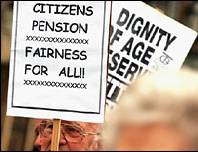|
|
Pension Reforms 'May Harm Firms'
BBC News
United
Kingdom
February 20, 2006

The CBI's John Cridland says firms should be 'cajoled' into contributing.
Ministers should reject proposals to force firms to pay into staff pension schemes, business leaders have urged.
Plans for a national pensions savings scheme put forward by the Pensions Commission would put too much financial strain on small firms, the CBI warned.
It said it supported a savings scheme, but firms and workers must have an equal right to opt out, otherwise job creation would be harmed.
But the TUC accused the CBI of trying to "sabotage" the reforms.
The TUC urged ministers to ignore calls from the CBI to reject proposals to force firms to pay into staff pension schemes.
"Without some modest compulsion, the race to the bottom can only continue as good employers are undercut by the bad who refuse to provide a pension for staff," said TUC general secretary Brendan Barber.
The government will unveil its plans for the pension system in the spring.
No incentive
The CBI said that forcing firms to contribute to pensions could have serious consequences.
"You'd get a lot of smaller businesses going to the wall," CBI chief Sir Digby Jones told the BBC.
Most worryingly, he said, compulsory pensions payments would offer firms no incentive to pay more than the levels set out by law.
"A lot of companies that currently do pension provision will say, 'well, the government's only making me do 3%. I'm currently doing 5%, well I won't in the future, I'll do 3%'," he explained.
While the CBI wants as many individuals and companies as possible in pension schemes, "forcing employers to contribute is neither fair, nor equitable or sensible", said CBI deputy director general John Cridland.
Automatic enrolment - which would "overcome the existing inertia about pension provision among employers and employees alike"- would be a better solution, he said.
'Cajole not compel'
He asked why a small company should be forced to pay into a pension scheme if doing so could put it out of business.
"The CBI believes there must be an equal right to opt out for both business and employee so individual economic realities can be taken into account."
Mr Cridland added that the CBI's proposals were designed to "cajole employers, not compel them" to pay into pensions schemes.
One of the CBI's ideas is to introduce a so-called Pension Builder scheme.
It is based on a voluntary scheme in the US where workers divert some of their annual pay rise into savings.
However, Lord Turner - who led the Commission which put forward the pension plans - said that the CBI's proposals would not be cost-effective.
"The proposals which the CBI have would actually cost the government £500m," he told the BBC.
That money would be better spent on offsetting the costs of a compulsory element of employer contribution, he added.
"But the basic idea that we are trying to end up with as many people as possible saving, with both employee and employer contributions, and that the government has to pay an enabling role in making that happen, that is actually
agreed," Lord Turner said
|
|



